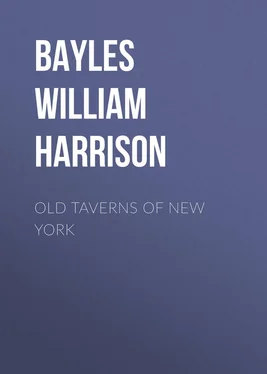William Bayles - Old Taverns of New York
Здесь есть возможность читать онлайн «William Bayles - Old Taverns of New York» — ознакомительный отрывок электронной книги совершенно бесплатно, а после прочтения отрывка купить полную версию. В некоторых случаях можно слушать аудио, скачать через торрент в формате fb2 и присутствует краткое содержание. Жанр: foreign_antique, foreign_prose, на английском языке. Описание произведения, (предисловие) а так же отзывы посетителей доступны на портале библиотеки ЛибКат.
- Название:Old Taverns of New York
- Автор:
- Жанр:
- Год:неизвестен
- ISBN:нет данных
- Рейтинг книги:3 / 5. Голосов: 1
-
Избранное:Добавить в избранное
- Отзывы:
-
Ваша оценка:
- 60
- 1
- 2
- 3
- 4
- 5
Old Taverns of New York: краткое содержание, описание и аннотация
Предлагаем к чтению аннотацию, описание, краткое содержание или предисловие (зависит от того, что написал сам автор книги «Old Taverns of New York»). Если вы не нашли необходимую информацию о книге — напишите в комментариях, мы постараемся отыскать её.
Old Taverns of New York — читать онлайн ознакомительный отрывок
Ниже представлен текст книги, разбитый по страницам. Система сохранения места последней прочитанной страницы, позволяет с удобством читать онлайн бесплатно книгу «Old Taverns of New York», без необходимости каждый раз заново искать на чём Вы остановились. Поставьте закладку, и сможете в любой момент перейти на страницу, на которой закончили чтение.
Интервал:
Закладка:
IV
The Black Horse
In the early part of the eighteenth century, there stood on the southern corner of Smith and Garden Streets, the present William Street and Exchange Place, the Black Horse Tavern, kept by John DeHoneur, who seems to have been its landlord for many years. John or Johannes DeHoneur was recommended for the office of captain of militia in June, 1709. Whether he was a tavern-keeper at this time, or how soon after he became one, we do not know, but on October 18, 1727, the assembly directed that the Committee on Grievances meet every Tuesday and Friday, during the sessions, at five o’clock in the afternoon, at the house of John DeHoneur, and that the first meeting be on Friday next. The next year the Committee on Grievances requested permission to meet at other place and time than at the place and time appointed for their meeting, and they were allowed by the assembly to meet at such other times and places as they should judge necessary, but they, nevertheless, must meet every Thursday evening at the house of John DeHoneur. It continued to be the meeting place of committees, and ten years after, in 1737, it was the meeting place, by appointment of the assembly, of the Committee of Privileges and Elections. In the record it is sometimes named as the house of John DeHoneur, and at other times as the Black Horse Tavern. In the contest between Cornelius Van Horne and Adolph Phillipse, they were ordered to exchange lists at the house of John DeHoneur.
The assembly, like the common council, were inclined to meet at taverns for the transaction of public business, where they were evidently surrounded by a more cheerful atmosphere than in the cold halls of legislation and justice. Where the room was warmed by a large and lively fire in the spacious fireplace, and the inner man warmed and exhilarated by good old wine, business was transacted with more cheerfulness and alacrity. The Black Horse Tavern was the scene of many such meetings, and, no doubt, of some very exciting ones. In the contest over the votes for Van Horne and Phillipse there were, very likely, some lively discussions. The Black Horse was for many years one of the most prominent taverns in the city.
Governor Montgomerie, after being governor of New York about two years, died on the 1st of July, 1731, and Rip Van Dam, as senior member of the council, and president of that body, became, ex officio , acting governor of the province.
Governor Cosby was appointed to succeed Montgomerie, but did not arrive until the 1st of August, 1732, so that Van Dam was acting governor for a period of thirteen months. He had been invested with all the powers, duties, and rights of the office, and had been allowed to draw the full amount of the salary from the public funds. Governor Cosby, like almost all the governors sent out to the provinces, had a sharp eye to his own profit, and had obtained, before he left England, an order on Van Dam for one-half of the salary, emoluments and perquisites of the office during the time that the latter had exercised the chief authority; and, accordingly, made demand shortly after his arrival. Van Dam was willing to surrender one-half of the salary which he had received if Cosby would pay to him one-half of the receipts, other than salary, and not otherwise, Van Dam resisting, Cosby instituted suit by way of information in the equity side of the court of exchequer, where he was confident of a decision in his favor. The counsel for Van Dam excepted to the jurisdiction of the court as being illegal. Great excitement ensued in consequence of a division in the court itself. Chief Justice Morris supported the exception, the two associate judges, DeLancey and Phillipse, voting against the plea. The decision of Chief Justice Morris annoyed the governor, who demanded a copy of it. Morris, to prevent misrepresentation, had it printed and sent it to the governor with a letter. Both the decision and the letter were published in the Gazette. This exasperated the governor beyond all bounds, and almost immediately Morris was removed from the bench. Shortly after James DeLancey, who afterwards became prominent, was appointed chief justice in his place.
The contest between Cosby and Van Dam, at first personal, soon involved the people, and divided them into two parties. Those in office, and their following, supported the governor, while the party of the people, especially after the removal of the chief justice, were violently opposed to the arbitrary act of the governor in removing a judge because his decision was not as he wished, and to the favoritism which could, by an ex post facto order, divest any of the colonial officers of salary earned and appropriated to individual use, and direct the amount to be paid to a stranger who had performed no service for it. If this were conceded, there would be little stability in the rights of British subjects.
In the fall of 1733, Lewis Morris, being removed from the office of chief justice, offered himself as a candidate for representative for the county of Westchester in the assembly. Opposed to him was William Forster, supported by the chief justice, James DeLancey, and the second judge, Frederick Phillipse, who both appeared in person on the ground, and exerted their influence to the utmost to defeat the election of Morris. The account of this election, as told in the first number of the New York Weekly Journal, reads like a page from the history of feudal times, when the lords appeared upon the scene, followed by their retainers, ready for contests in the lists or on the field of battle.
The high sheriff of the county, having, by papers affixed to the church of East Chester and other public places, given notice of the day and place, without stating any time of day when the election was to take place, the electors for Morris were very suspicious of some intended fraud. To prevent this, about fifty of them kept watch upon and about the Green at East Chester, the place of election, from twelve o’clock the night before until the morning of the appointed day.
The electors of the eastern part of the county began to move on Sunday afternoon and evening, so as to be at New Rochelle by midnight. On their way through Harrison’s Purchase, the inhabitants provided for their entertainment, there being a table at each house plentifully provided for that purpose. About midnight they all met at the home of William LeCount, at New Rochelle, whose house not being large enough to entertain so many, a large fire was made in the street, at which they sat till daylight, when they again began to move. On the hill, at the east end of town, they were joined by about seventy horsemen, electors of the lower part of the county, and then proceeded to the place of election in the following order: First, rode two trumpeters and three violinists; next, four of the principal freeholders, one of whom carried a banner, on one side of which was affixed in golden capitals, KING GEORGE, and on the other side, in like golden capitals, LIBERTY & LAW; next followed the candidate, Lewis Morris, formerly chief justice of the province; then two colors. Thus, at sunrise, they entered the Green of East Chester, the place of election, followed by about three hundred horsemen, the principal freeholders of the county (a greater number than had appeared for one man since the settlement of the county). After riding three times around the Green, they went to the houses of Joseph Fowler and Mr. Child, who were well prepared for their reception.
About eleven o’clock appeared William Forster, the candidate of the other side; after him came two ensigns , borne by two of the freeholders; then came the Honorable James DeLancey, chief justice of the province of New York, and the Honorable Frederick Phillipse, second judge of the province and Baron of the Exchequer, attended by about one hundred and seventy horsemen, freeholders, and friends of Forster. They entered the Green on the east side and rode round it twice. As they passed, the second judge very civilly saluted the former chief justice by taking off his hat, a salutation which the former judge returned in the same manner. After this, they retired to the house of Mr. Baker, who was prepared to receive and entertain them.
Читать дальшеИнтервал:
Закладка:
Похожие книги на «Old Taverns of New York»
Представляем Вашему вниманию похожие книги на «Old Taverns of New York» списком для выбора. Мы отобрали схожую по названию и смыслу литературу в надежде предоставить читателям больше вариантов отыскать новые, интересные, ещё непрочитанные произведения.
Обсуждение, отзывы о книге «Old Taverns of New York» и просто собственные мнения читателей. Оставьте ваши комментарии, напишите, что Вы думаете о произведении, его смысле или главных героях. Укажите что конкретно понравилось, а что нет, и почему Вы так считаете.












